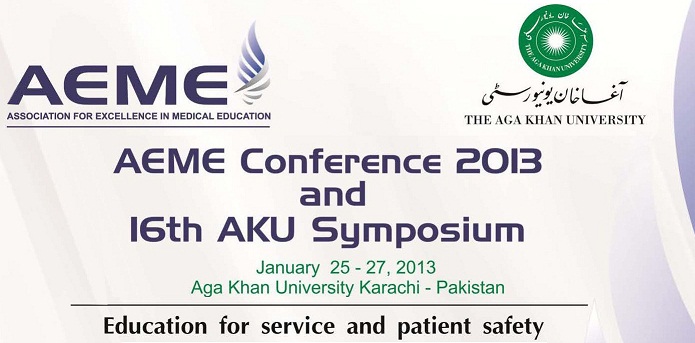Day 1 : Poster Presentations (Theme: Curricular Innovations)
An innovation in the undergraduate medical curriculum: integrating a course on health economics longitudinally
Location
Auditorium Pond Side
Start Date
26-1-2013 10:30 AM
Abstract
Background: In developing countries the delivery of affordable and cost effective medical care is a big challenge. As the majority of healthcare financing is private, out-of-pocket, physicians need to provide medical care accounting for the family’s capacity to pay and adopt cost effective clinical pathways. Objective: To enable medical graduates to practice safe and cost-effective medicine through application of basic principles of health economics through an integrated longitudinal module utilizing innovative teaching and learning strategies
Methods: A literature search was carried out on the health system challenges in developing countries and courses on health economics and health policy in medical curricula. Spiral Introduction of content contextual to Pakistan was planned. An interactive lecture on principles of healthcare financing in year 2 was strengthened with the addition of concepts of efficiency and equity in healthcare. An innovative methodology to teach the principles of efficiency and cost effectiveness at the patient level was introduced in a consultation skills workshop in year 3. Issues pertaining to patient-doctor communication, gender, culture and ethics and cost of treatment versus prevention are highlighted and debated utilizing the ‘role play and freeze-frame technique’ with a family afflicted by thalassemia using simulated patients. Aspects of health economics in medical decision making will be incorporated in year 4. The holistic approach of health care financing will be revisited in a multidisciplinary team including health administrators in year 5. Assessment will be done through best choice and short answer questions and projects.
Results: Student and faculty feedback was obtained separately. Student appraisal of the Year 2 Lecture was between “very good” to “excellent” on 10 assessment criteria. The new content in the year 3 longitudinal workshop was graded ‘excellent’.
Conclusions: Excellent feedback and robust discussion by the students are evidence of the success of this module. The measurement of the short and long term impact of this course after graduation will be challenging.
Keywords: Health Economics, innovation, integrated, curriculum, undergraduate
An innovation in the undergraduate medical curriculum: integrating a course on health economics longitudinally
Auditorium Pond Side
Background: In developing countries the delivery of affordable and cost effective medical care is a big challenge. As the majority of healthcare financing is private, out-of-pocket, physicians need to provide medical care accounting for the family’s capacity to pay and adopt cost effective clinical pathways. Objective: To enable medical graduates to practice safe and cost-effective medicine through application of basic principles of health economics through an integrated longitudinal module utilizing innovative teaching and learning strategies
Methods: A literature search was carried out on the health system challenges in developing countries and courses on health economics and health policy in medical curricula. Spiral Introduction of content contextual to Pakistan was planned. An interactive lecture on principles of healthcare financing in year 2 was strengthened with the addition of concepts of efficiency and equity in healthcare. An innovative methodology to teach the principles of efficiency and cost effectiveness at the patient level was introduced in a consultation skills workshop in year 3. Issues pertaining to patient-doctor communication, gender, culture and ethics and cost of treatment versus prevention are highlighted and debated utilizing the ‘role play and freeze-frame technique’ with a family afflicted by thalassemia using simulated patients. Aspects of health economics in medical decision making will be incorporated in year 4. The holistic approach of health care financing will be revisited in a multidisciplinary team including health administrators in year 5. Assessment will be done through best choice and short answer questions and projects.
Results: Student and faculty feedback was obtained separately. Student appraisal of the Year 2 Lecture was between “very good” to “excellent” on 10 assessment criteria. The new content in the year 3 longitudinal workshop was graded ‘excellent’.
Conclusions: Excellent feedback and robust discussion by the students are evidence of the success of this module. The measurement of the short and long term impact of this course after graduation will be challenging.
Keywords: Health Economics, innovation, integrated, curriculum, undergraduate

